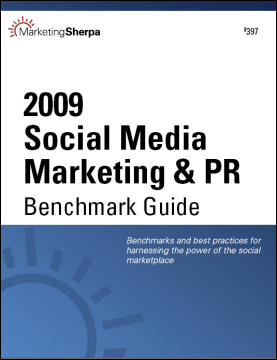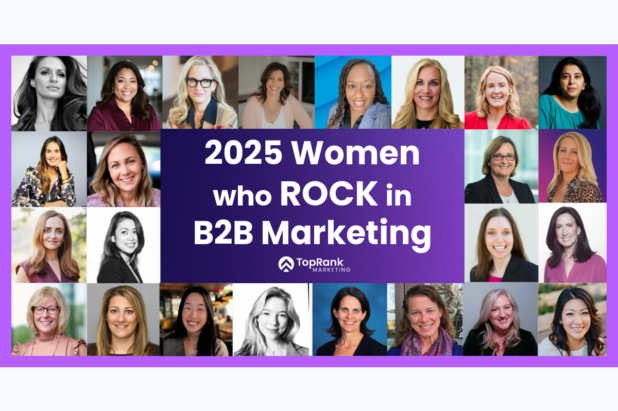Review of the 2009 Social Media Marketing & PR Benchmark Guide from Marketingsherpa
A new report on social media has been released from Marketingsherpa with Senior Analyst, Sergio Balegno, as lead author. Over 1,800 marketing and PR professionals responded to the survey resulting in one of the most complete, data supported guides on social media published to date.
There are numerous books, seminars and “experts” touting social media advice for marketing and PR professionals. Much of that advice is based on experience and even more is based on wishful thinking. This report takes a structured approach to data collection and analysis offering readers the advantage of understanding what works and what doesn’t when it comes to social media marketing and PR.
The guide is unique in that it provides insight for both marketing and public relations and is divided into 5 sections:
- Emerging state of social media marketing & PR
- Planning for social media with strategic goals and tactics
- Social media and public relations
- Social media metrics and budgets
- Web 2.0 and social media
The guide also includes a special section, “Nine Steps to Social Marketing Success” giving a specific sequence of tasks for marketers and PR professionals to follow, much like a social media blueprint. What’s not to like about practical, “act on it now” advice?
As an Internet marketing agency that has been providing companies with advice on social media advice (starting with business blogs in 2004), there is a particular appreciation for good information sources, especially those driven by data more than theory. An informed customer gets more value from experienced consulting and can often do a better job of implementation.
Social media isn’t something companies “do”, it’s something they “are”.
Speaking of data, the survey results showed that 76% of respondents agreed that social media is changing the way their companies communicate. Marketers are backing up that perspective with budgets, even during the economic downturn. In fact, for 2009, social media and email marketing were the only 2 tactics where companies planned on increasing spending.
With social media a hot topic in every major business publication, blog and conference, companies are motivated yet mystified about where the social web fits within their marketing communications strategies. They’re also wondering whether their companies are a fit for social media engagement. The Marketingsherpa survey revealed that the biggest barriers to social media adoption by companies are a lack of knowledgable staff and the ability to measure ROI.
“Know it alls”, know very little. Interestingly, 2/3 of respondents that have not used social media marketing or PR indicated that they were very or somewhat knowledgeable. Clearly, there’s a disconnect between being familiar with a concept and having expertise to execute effectively.
There’s no such thing as a free lunch. There is a common perception that social media is “free” but the reality is that it’s time consuming, carrying substantial costs for learning curve and labor. Fixing your own car is free too, but how much sense does it make to figure that out compared to using a manual/guide or better yet, a mechanic?
Many, but not all, situations involving social media are not that different. Effective adoption can be facilitated by companies or consultants that have actual experience and expertise, especially when it comes to developing a social media roadmap.
This notion was supported by the survey which reported that social media specialists are more likely to accomplish goals than in-house teams. Specifically, social media specialists implement effectively 69% of the time vs in-house marketing PR team 58% of the time.
Easier to measure, harder to get results. Another particularly surprising result from the Marketingsherpa suvey was that the most measurable social media tactics tend to be the least effective. Social media advertising is an example of a highly measurable tactic that has yet to result in substantial ROI. Marketers that are obsessed with tracking social media results quantitatively, often miss the point. They may find themselves using less effective social media tactics simply because they are more measurable in way they are familiar with, instead of emphasizing the relationship, influence and word of mouth capabilities.
Branding loves social media. Survey respondents indicated that achieving branding goals was the most effective use of social media. Reputation, awareness and improving search engine rankings and web site traffic were also rated highly. Building networks and promoting content within social media channels can certainly result in search engine optimization benefits, but focusing on those outcomes specifically are difficult to sustain.
These insights are the tip of the iceberg in the report and I’d recommend the investment. Between social web participation, research based resources like this report and practical, outside consultants and hands on training like SocialMediaSmarts (a workshop offered by TopRank and the national DMA), companies can improve their ability to effectively participate in and gain business results from the social web.



